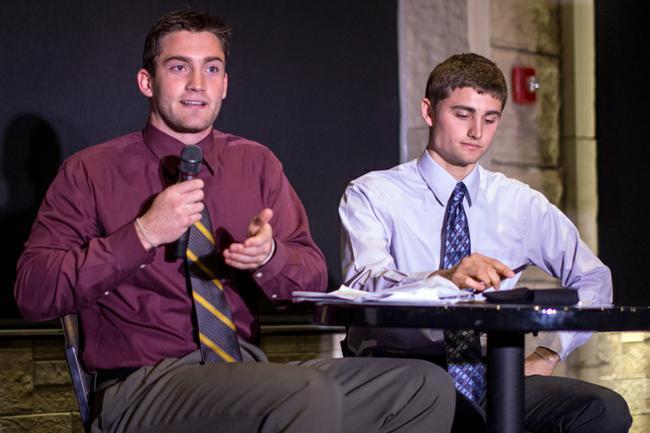
n the Missouri Students Association’s second presidential debate hosted by the MSA Board of Elections Commissioners, candidates clashed over the MSA budget, the attainability of campaign goals and MSA’s transparency.
The debate, which was moderated by MSA Director of Communications Zach Toombs and Vice Chancellor of Student Affairs Cathy Scroggs, provided an opportunity for the three slates — Nick Droege/Zach Beattie, Spencer Maass/Shelby Catalano and Tom Wright/Bo Mahr — to show the differences in their platforms.
Just more than five minutes into the debate, the first major difference arose: money.
Wright/Mahr has campaigned on cutting spending within MSA. Wright said he and Mahr plan to reduce the presidential and vice presidential salaries to minimum wage, cut the MSA Senate jacket retention program — which provides MSA senators with jackets if they have perfect attendance — and cut the MSA Senate annual awards banquet. By doing so, more money could fund programs that benefit students directly, Wright said.
This caused controversy among other slates.
“I don’t think anyone runs for these positions for the money,” Droege said. “If you are running for anything for the money, then you can go get a waiter or waitress job downtown and make (the $600 the president or $500 the vice president makes monthly) in one night on a game day.”
The proposed decreases in salary would amount to approximately $2,800, according to a previous Maneater article. This would only be about .16 percent of the total $1.7 million MSA budget, Beattie said.
“In the grand scheme of things, with a budget of $1.7 million dollars, $2,800 is not going to do that much,” Catalano said.
Wright and Mahr also criticized Droege/Beattie for receiving $2,000 from Droege’s fraternity, Pi Kappa Alpha. The high costs to campaign deter others from being able to campaign, Mahr said.
Beattie said though he and Droege have a $2,000 budget, they are not planning to spend all of it. He also said Droege earned this campaign donation because of the work he put into the fraternity.
The slates also debated the attainability of their campaign goals.
Droege said he and Beattie have discussed all of their campaign goals with MU administrators and organizations to ensure they can all be accomplished — a claim Beattie said the other slates cannot state.
Maass said he and Catalano are setting bigger goals, such as making MU coal-free.
“We’re taking on bigger issues that can’t be solved in a year,” he said. “We’re trying to set the foundation for those bigger issues that one slate cannot possibly take on and solve in one term. I think this is … more important than attaining little goals in a year.”
Wright said he and Mahr are not focusing on how attainable their goals are — rather, they are focusing on how new their ideas are.
“We’re trying to bring new ideas and push the envelope,” Wright said. “We’re not running on the idea that every single thing is attainable. That is (Droege/Beattie’s) mantra. We’re trying to bring change to MSA.”
Droege said he disagrees Wright/Mahr are introducing new programs. He cited three examples: first, the syllabus archive, which has been campaigned on for more than two years; second, the plus/minus grading system, which current President Xavier Billingsley and Vice President Helena Kooi are working on; and third, diversity weeks, which are already implemented, such as the recent Coming Out Week.
Another point of contention, mainly between Droege/Beattie and Wright/Mahr, was transparency within MSA.
Neither Wright nor Mahr are currently in MSA, which Mahr said gives them a unique perspective. As the self-titled outside voice, Wright said he wants to challenge the status quo within MSA.
“If you are not in MSA, you don’t know what’s going on in MSA,” Wright said. “You don’t know what legislation is being passed. Students don’t know what their student fees are going to. What we’re trying to do with the office is make it more accountable than it was a year ago.”
As an example of MSA’s lack of accountability, Wright discussed MSA’s new Legislative Advocacy Officer, a position created by Steven Dickherber, previously the MSA Chief of Staff, and then was given to him. Beattie said Dickherber was given the position because he was the most qualified, not because of an MSA bureaucracy, as Wright called it.
The night ended with Wright’s final statement that the election is ultimately a choice between two ideas: maintaining the status quo by electing MSA members (with either Droege/Beattie or Maas/Catalano) or creating change by electing non-MSA members (with Wright/Mahr).